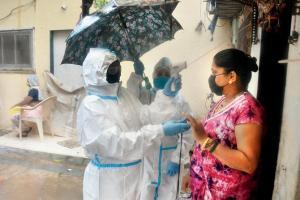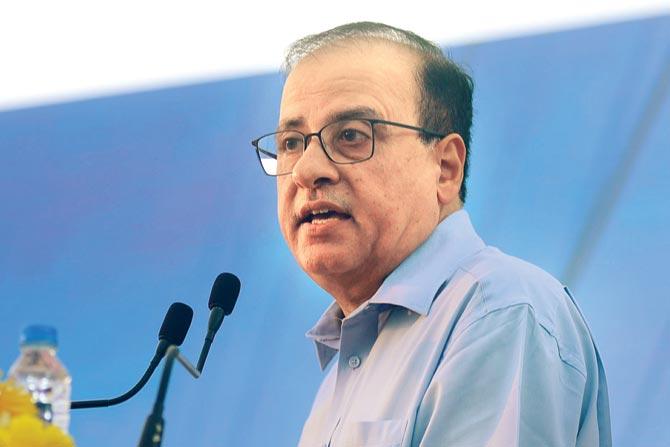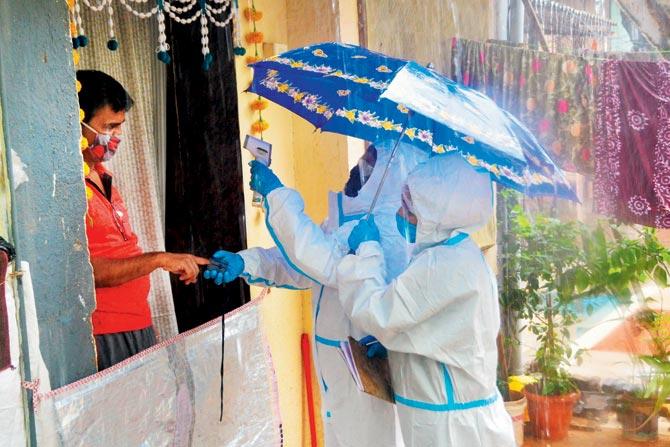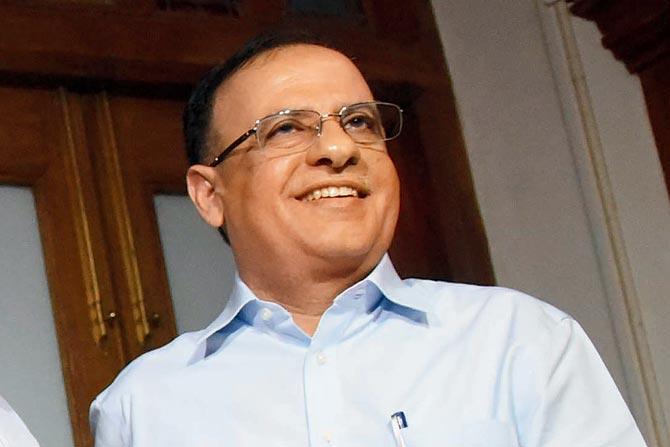Chief Secretary Ajoy Mehta on the alarming situation of non-availability of beds, data discrepancies, and how the state will reboot the economy

A team of BMC doctors checking residents in Kurla on Thursday. Pic/ Sayyed Sameer Abedi
Over the past three months, Maharashtra has reeled under the pandemic and Mumbai carried much of the load of COVID-19 patients. Apart from complaints regarding access to proper healthcare, many people have faced losses in their businesses and some have even lost their jobs. Till date, the state has witnessed over 1.1 lakh cases and over 5,600 COVID-19-related deaths. Despite setting up healthcare facilities for COVID patients, the civic body and the state government have also been criticised for a number of issues.
ADVERTISEMENT
Nearly two weeks after the lockdown restrictions were lifted, mid-day asked Chief Secretary Ajoy Mehta about the plan for the city. Mehta highlighted certain short-term and long-term solutions to deal with the pandemic as well as recover from the economic setback Mumbai has suffered. These include setting up a tracking system for all COVID patients for better data management and holding auditors responsible for proper monitoring beds at private hospitals. There are also plans to re-assess health infrastructure and protocol for management of infectious diseases.
With the reconciliation of the data on COVID-19 patients, the mortality rate is considerably higher. Why aren't the numbers dropping?
There is no doubt that initially the number of deaths were high. The disease was new and no one really knew about the treatment protocols. Early detection was an issue since we didn't have the complete institution in place for it. But now the average daily death rate is between 3-4 per cent. The number of deaths are no longer high and we are trying to bring them down further.
Due to the data reconciliation, the old deaths were added to the total which is why the figures increased. The daily trend of figures now show a marked decrease.
You had mentioned a new software that will be set up and different districts will have a different portal for data updation. Could you tell us more about this?
The use of IT to improve a process is ongoing work and every time we notice a loophole, we upgrade the system. Initially, we noticed that we didn't have one location which has information on the number of beds and we fixed it. Many other issues also came up. We also found that people take multiple tests under different names and there may be different addresses and we are working on cleaning the data.
Continuous tracing is essential from the time the patient tested positive, to the time the patient was discharged or in case there was an unfortunate death.

Ajoy Mehta
We have been noticing data discrepancies and are dealing with them. With the new tracking system that will be in place in the next 4-5 days, within 48 hours (of testing positive) we will know what happened to every patient. Earlier in some cases, even after the patient died, there would be a lapse of 10-15 days before the data would reach the central database. Now that the data starts moving electronically, we can put deadlines on it.
Despite the regulation of hospitals allocating 20 per cent of their total beds for COVID patients and deputing auditors, availability of beds is still an issue and there are allegations that private hospitals are under-reporting the number of vacant beds. How to resolve this issue and will private hospitals face punitive action?
If auditors say that they are not able to get the information (on the accurate number of beds available at private hospitals), then we will have to think whether they should be sacked. Their job is to find out. Their incompetence will not be tolerated. As an auditor, he/she has been given powers under the Epidemic Act and they should personally go and check.
If it is brought to our notice that beds are lying empty, then we will definitely take action against private hospitals for not declaring them and under the Epidemic Act, they are liable for action.
At a decentralised level, our doctors are now calling up the patients when they test positive and checking their symptoms. My advice to everyone is to not call hospitals asking for a bed. Instead of the patient hunting for a bed, we handhold the patient to where they should go. Hospital beds will be given to those who need them.
It has been more than a week since the lockdown restrictions were eased. What would be the next step for the city? Given the rate of cases, when are local trains likely to be opened for the public?
Opening up the city will be a cautious and well-thought out decision. Every time we ease restrictions, there will be increase in movement which will lead to an incremental increase in the number of positive cases.

Civic health workers conduct door-to-door thermal reading and oximeter checks at Wadia Estate in Kurla West on Thursday. Pic/ Sayyed Sameer Abedi
Till now, we have opened up the agriculture sector completely and industries, barring those in containment zones, are also open. We have allowed shops to open as well as offices with 10 per cent staff. All these things are capped at a certain percentage right now. These limitations will have to be pushed up gradually while considering factors like public transport since that could be where the infection spreads. Public transport has to keep pace with the opening up of the city and it needs to be a carefully calibrated decision.
The monsoon months will bring in cases of dengue, malaria and leptospirosis. With the civic hospitals already overflowing with COVID patients, what kind of planning has been done to deal with this?
We had factored monsoon-related diseases in and created these jumbo facilities so as to reduce the load of COVID cases on hospitals. Our strategy is to push out as many COVID cases which do not need hospital care to COVID care centres and dedicated COVID hospitals as we can, and bring only those who are critical into hospitals. We have seen that hardly 5-7 per cent of COVID cases need hospitalisation and only those should be taken to hospitals. This will clear up the hospital beds for patients of other monsoon-related diseases.
Despite the growth of private hospitals over the past years, Kasturba Hospital continues to be the only hospital designated for infectious diseases in the financial capital. Going forward, what kind of improvements will be made to the existing system and will any investments be made in health infrastructure?
Of course. There will be re-thinking on how we spend on health in the state as well as in the country. However, many people say that this exposes that we haven't spent enough money on health. That isn't the case. There was a huge emphasis on primary healthcare and Maharashtra has done extremely well. Let's not undermine the effort that has gone in with respect to infant mortality rates, measles, smallpox, polio. But yes, now the focus has to shift to infectious diseases.
When the first case came to Maharashtra on March 9, we had just three infectious diseases hospitals in the state. Today, in a matter of just three months, we have created almost 3,000 such isolation facilities. Right now, we are fighting the fire but we will have to re-think our infectious diseases management protocol. Dealing with infectious diseases is a different ball game altogether, and whole new strategies and protocols which will include more hospitals, will have to be put in place.
Companies have laid off employees and people are dealing with a financial crisis. What is the level of economic setback that Mumbai has suffered due to COVID and how long would you estimate it will take to recover from it?

Yes, there is a setback. However, Mumbai with its resilience will bounce back very fast. As a government, the strategy rests on three fundamental things. Firstly, we have to make interventions to prevent job losses. There is a whole spectrum of ways of preventing loss of jobs like offering incentives, allowing expansions to take place or re-skilling people. There may be some businesses which may be finding it very difficult to open or open with few staff members. That staff has to be re-skilled to do something else.
Secondly, we have to make changes in the system which will enable the economic machinery to start rotating again at full capacity. Thirdly, as a government, we need to ensure that there is a safety net to protect the vulnerable sections of the population including the physically challenged, people working on the fringes of economy or unorganised labour.
Catch up on all the latest Mumbai news, crime news, current affairs, and a complete guide from food to things to do and events across Mumbai. Also download the new mid-day Android and iOS apps to get latest updates.
Mid-Day is now on Telegram. Click here to join our channel (@middayinfomedialtd) and stay updated with the latest news
 Subscribe today by clicking the link and stay updated with the latest news!" Click here!
Subscribe today by clicking the link and stay updated with the latest news!" Click here!






